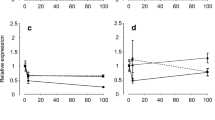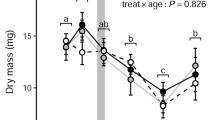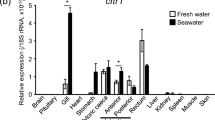Abstract
Goldfish, Carassius auratus, adaptively remodel their gills in response to changes in ambient oxygen and temperature, altering the functional lamellar surface area to balance the opposing requirements for respiration and osmoregulation. In this study, the effects of thermal- and hypoxia-mediated gill remodeling on branchial Na+ fluxes and the distribution of putative Na+-transporting ionocytes in goldfish were assessed. When assessed either in vitro (isolated gill arches) or in vivo at a common water temperature, the presence of an interlamellar cell mass (ILCM) in fish acclimated to 7°C clearly decreased Na+ efflux across the gill relative to fish maintained at 25°C and lacking an ILCM. However, loss of the ILCM in 7°C-acclimated fish exposed to hypoxia led to a decrease in Na+ efflux (assessed under hypoxic conditions) despite the apparent large increases in functional lamellar surface area. Goldfish possessing an ILCM were able to sustain Na+ uptake, albeit at a lower rate matched to efflux, owing to the re-distribution of ionocytes expressing genes thought to be involved in Na+ uptake [Na+/H+ exchanger isoform 3 (NHE3) and V- type H+-ATPase] to the edge of the ILCM where they can establish contact with the surrounding environment. NHE-expressing cells co-localized with Na+/K+-ATPase expression, suggesting a role for NHE in Na+-uptake in the goldfish. Implications of the ILCM on ion fluxes in the goldfish are discussed.









Similar content being viewed by others
Explore related subjects
Discover the latest articles and news from researchers in related subjects, suggested using machine learning.References
Avella M, Bornancin M (1989) A new analysis of ammonia and sodium transport through the gills of the freshwater rainbow trout (Salmo gairdneri). J Exp Biol 142:155–175
Barron MG, Tarr BD, Hayton WL (1987) Temperature-dependence of cardiac output and regional blood flow in rainbow trout, Salmo gairdneri. J Fish Biol 31:735–744
Burgess DW, Marshall WS, Wood CM (1998) Ionic transport by the opercular epithelia of freshwater acclimated tilapia (Oreochromis niloticus) and killifish (Fundulus heteroclitus). Comp Biochem Physiol 121A:155–164
Burggren WW (1982) Air gulping improves blood oxygen transport during aquatic hypoxia in the goldfish Carassius auratus. Physiol Zool 55:327–334
Catlett RH, Millich DR (1976) Intracellular and extracellular osmoregulation of temperature acclimated goldfish Carassius auratus L. Comp Biochem Physiol 55:261–269
Edwards SL, Weakley JC, Diamandouros AW, Claiborne JB (2010) Molecular identification of Na+-H+ exchanger isoforms (NHE2) in the gills of the euryhaline teleost Fundulus heteroclitus. J Fish Biol 76:415–426
Evans DH (2008) Teleost fish osmoregulation: what have we learned since August Krogh, Homer Smith and Ancel Keys. Am J Physiol 295:R704–R713
Fu SJ, Brauner CJ, Cao ZD, Richards JG, Peng JL, Dhillon R, Wang YX (2011) The effect of acclimation to hypoxia and sustained exercise on subsequent hypoxia tolerance and swimming performance in goldfish (Carassius auratus). J Exp Biol 214:2080–2088
Gonzalez RJ, McDonald DG (1994) The relationship between oxygen uptake and ion loss in fish from diverse habitats. J Exp Biol 190:95–108
Hochachka PW (1986) Defense strategies against hypoxia and hypothermia. Science 231:234–241
Houston AH, Madden JA (1968) Environmental temperature and plasma electrolyte regulation in the carp, Cyprinus carpio. Nature 217:969–970
Houston AH, Mearow KM (1982) Branchial and renal (Na+/K+) ATPase and carbonic anhydrase activities in a eurythermal freshwater teleost, Carassius auratus L. Comp Biochem Physiol 71:175–180
Hughes GM (1966) The dimension of fish gills in relation to their function. J Exp Biol 45:177–195
Hwang P-P (2009) Ion uptake and acid secretion in zebrafish (Danio rerio). J Exp Biol 212:1745–1752
Lahlou B, Henderson IW, Sawyer WH (1969) Sodium exchanges in goldfish (Carassius auratus L) adapted to a hypertonic saline solution. Comp Biochem Physiol 28:1427–1433
Lomholt JP, Johansen K (1979) Hypoxia acclimation in carp: how it affects O2 uptake, ventilation, and O2 extraction from water. Physiol Zool 52:38–49
Lutz PL, Nilsson GE (1997) Contrasting strategies for anoxic brain survival—glycolysis up or down. J Exp Biol 200:411–419
Mackay WC (1974) Effect of temperature on osmotic and ionic regulation in goldfish, Carassius auratus L. J Comp Physiol 88:1–19
Maetz J (1956) Les échanges de sodium chez le poisson Carassius auratus L. Action d’un inhibiteur de l’anhydrase carbonique. J Physiol (Paris) 48:1085–1099
Maetz J, Garcia-Romeu F (1964) The mechanism of sodium and chloride uptake by the gills of a fresh-water fish, Carassius auratus: II. Evidence for NH4 +/Na+ and HCO3 −/Cl− exchanges. J Gen Physiol 47:1209–1227
Mandic M, Lau GY, Nijjar MMS, Richards JG (2008) Metabolic recovery in goldfish: a comparison of recovery from severe hypoxia exposure and exhaustive exercise. Comp Biochem Physiol C 148:332–338
Matey V, Richards JG, Wang Y, Wood CM, Rogers J, Davies R, Murray BW, Chen X-Q, Du J, Brauner CJ (2008) The effect of hypoxia on gill morphology and ionoregulatory status in the Lake Qinghai scaleless carp, Gymnocypris przewalskii. J Exp Biol 211:1063–1074
Mitrovic D, Perry SF (2009) The effects of thermally induced gill remodeling on ionocyte distribution and branchial chloride fluxes in goldfish (Carassius auratus). J Exp Biol 212:843–852
Mitrovic D, Dymowska A, Nilsson GE, Perry SF (2009) Physiological consequences of gill remodeling in goldfish (Carassius auratus) during exposure to long-term hypoxia. Am J Phyiol 297:R224–R234
Murphy PG, Houston AH (1973) Environmental temperature and the body fluid system of the fresh-water teleost—plasma electrolyte levels and branchial microsomal (Na+-K+) ATPase activity in the thermally acclimated goldfish (Carassius auratus). Comp Biochem Physiol 47:563–570
Nilsson S (1986) Gill blood flow control. In: Nilsson S, Holmgren S (eds) Fish physiology: recent advances. Croom Helm, London, pp 86–101
Nilsson GE (2007) Gill remodeling in fish—a new fashion or ancient secret? J Exp Biol 210:2403–2409
Parks SK, Tresguerres M, Goss GG (2008) Theoretical considerations underlying Na+ uptake mechanisms in freshwater fishes. Comp Biochem Physiol 148C:411–418
Paxton R, Umminger BL (1983) Altered activities of branchial and renal Na/K- and Mg-ATPases in cold-acclimated goldfish (Carassius auratus). Comp Biochem Physiol 74B:503–506
Perry SF (1997) The chloride cell: structure and function in the gills of freshwater fishes. Ann Rev Physiol 59:325–347
Perry SF, Gilmour KM (2006) Acid-base balance and CO2 excretion in fish: unanswered questions and emerging models. Respir Physiol Neurobiol 154:199–215
Perry SF, Furimsky M, Bayaa M, Georgalis T, Nickerson JG, Moon TW (2003) Integrated involvement of Na +/HCO3 − cotransporters and V-type H+-ATPase in branchial and renal acid-base regulation in freshwater fishes. Biochem Biophys Acta 1618:175–184
Pfaffl MW (2001) A new mathematical model for relative quantification in real-time PCR. Nucleic Acids Res 29:2002–2007
Preest MR, Gonzalez RJ, Wilson RW (2005) A pharmacological examination of Na+ and Cl− transport in two species of freshwater fish. Physiol Biochem Zool 78:259–272
Prosser CL, Mackay W, Kato K (1970) Osmotic and ionic concentrations in some Alaskan fish and goldfish from different temperatures. Physiol Zool 43:81–89
Randall DJ, Baumgarten D, Malyusz M (1972) The relationship between gas and ion transfer across the gills of fishes. Comp Biochem Physiol 41:629–637
Russell JC, Chambers MM (1976) Comparative temperature dependence of (Na+ + K+)-ATPase. Physiol Chem Phys 8:237–251
Sardella BA, Cooper J, Gonzalez RJ, Brauner CJ (2004) The effect of temperature on juvenile Mozambique tilapia hybrids (Oreochromis mossambicus × O. urolepis hornorum) exposed to full-strength and hypersaline seawater. Comp Biochem Physiol 137:621–629
Smith A, Zhang J, Guay D, Quint E, Johnson A, Akimenko MA (2008) Gene expression analysis on sections of zebrafish regenerating fins reveals limitations in the whole-mount in situ hybridization method. Dev Dyn 237:417–425
Sollid J, Nilsson GE (2006) Plasticity of respiratory structures—adaptive remodeling of fish gills induced by ambient oxygen and temperature. Respir Physiol Neurobiol 154:241–251
Sollid J, De Angelis P, Gundersen K, Nilsson GE (2003) Hypoxia induces adaptive and reversible gross morphological changes in crucian carp gills. J Exp Biol 206:3667–3673
Sollid J, Weber RE, Nilsson GE (2005) Temperature alters the respiratory surface area of crucian carp (Carassius carassius) and goldfish (Carassius auratus). J Exp Biol 208:1109–1116
Towle DW, Rushton ME, Heidysch D, Magnani JJ, Rose MJ, Amstutz A, Jordan MK, Shearer DW, Wu WS (1997) Sodium/proton antiporter in the euryhaline crab Carcinus maenas: molecular cloning, expression and tissue distribution. J Exp Biol 200:1003–1014
Tzaneva V, Gilmour KM, Perry SF (2010) Respiratory responses to hypoxia or hypercapnia in goldfish (Carassius auratus) experiencing gill remodeling. Respir Physiol Neurobiol 175:112–120
Tzaneva V, Bailey S, Perry SF (2011) The interactive effects of hypoxemia, hyperoxia and temperature on the gill morphology of goldfish (Carassius auratus). Am J Physiol 300:1344–1351
Umminger BL (1969) Patterns of osmoregulation in freshwater fishes at temperatures near freezing. Physiol Zool 44:20–27
Watanabe S, Inokuchi M, Maruyama T, Kaneko T (2008) Na+/H+ exchanger isoform 3 expressed in apical membrane of gill mitochondrion-rich cells in Mozambique tilapia Oreochromis mossambicus. Fish Sci 74:813–821
Wood CM (1992) Flux measurements as indices of H+ and metal effects on freshwater fish. Aquat Toxicol 22:239–264
Wood CM, Kajimura M, Sloman KA, Scott GR, Walsh PJ, Amerida-Val VMF, Val AL (2007) Rapid regulation of Na+ fluxes and ammonia excretion in response to acute environmental hypoxia in the Amazonian oscar, Astronotus ocellatus. Am J Physiol 292:R2048–R2058
Wood CM, Iftikar FI, Scott GR, De Boeck G, Sloman KA, Matey V, Domingos FX, Duarte RM, Almeida-Val VMF, Val AL (2009) Regulation of gill transcellular permeability and renal function during acute hypoxia in the Amazonian oscar (Astronotus ocellatus): new angles to the osmorespiratory compromise. J Exp Biol 212:1949–1964
Acknowledgments
This research was supported by NSERC of Canada Discovery and Research Tools and Infrastructure grants to SFP. We thank Andrew Ochalski for technical guidance for the microscopy experiments and Bill Fletcher for his dedication to animal care.
Author information
Authors and Affiliations
Corresponding author
Additional information
Communicated by H.V. Carey.
Rights and permissions
About this article
Cite this article
Bradshaw, J.C., Kumai, Y. & Perry, S.F. The effects of gill remodeling on transepithelial sodium fluxes and the distribution of presumptive sodium-transporting ionocytes in goldfish (Carassius auratus). J Comp Physiol B 182, 351–366 (2012). https://doi.org/10.1007/s00360-011-0618-7
Received:
Revised:
Accepted:
Published:
Issue Date:
DOI: https://doi.org/10.1007/s00360-011-0618-7




